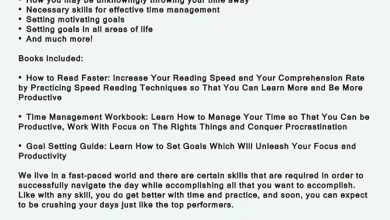How To Master The Art Of Time Management?

The time we have is one of the most valuable resources we have, yet it is also one of the most limited. We all have 24 hours a day, and how we choose to use that time can make all the difference in achieving our goals and living a fulfilling life.
However, with so many distractions and competing demands for our attention, it can be challenging to manage our time effectively. That’s where the art of time management comes in. But, how to master the art of time management?
To master the art of time management, one must conduct a time audit, set goals and prioritize tasks, break down tasks into manageable chunks and take advantage of task opportunities, create time blocks, minimize distractions, optimize attention and energy levels, get adequate sleep, and utilize effective time management methods.
In this guide, we will explore practical tips and strategies to help you become a master of time management. From setting priorities to avoiding procrastination, we will guide you through the steps to make the most of your time and achieve your full potential.
Benefits Of Effective Time Management
Effective time management is a crucial skill that can help individuals in different ways. Below, we will explore the benefits of effective time management.
Improved Productivity
Effective time management helps individuals complete tasks more efficiently, leading to increased productivity. By prioritizing tasks and setting aside dedicated time for each, individuals can make the most of their working hours. Time management also helps to avoid procrastination, which can lead to missed deadlines and added stress.
Reduced Stress Levels
Stress is often caused by feeling overwhelmed with too many tasks and not enough time to complete them. Effective time management can help reduce stress levels by breaking down tasks into manageable segments, scheduling time for relaxation and self-care, and avoiding overcommitment.
Improved Goal Achievement
Effective time management enables individuals to set realistic and achievable goals, allowing them to focus on what is most important. By prioritizing tasks and creating a plan to achieve these goals, individuals can increase their chances of success.
Better Work-Life Balance
Effective time management can help individuals achieve a better work-life balance by allowing them to allocate time for work, personal relationships, and hobbies. Taking time to prioritize tasks and dedicate time to different aspects of life can help individuals live a more fulfilling and satisfying life.
Improved Attention and Focus
Effective time management involves minimizing distractions and dedicating time for single-tasking, leading to improved attention and focus. By avoiding multitasking and focusing on one task at a time, individuals can improve their quality of work and achieve better results.
Improved Sleep Quality
Effective time management includes scheduling adequate time for rest and relaxation, leading to improved sleep quality. By avoiding overworking and setting aside time for rest, individuals can improve their energy levels and overall well-being.
How To Master The Art Of Time Management?
Time management is a skill that can significantly impact our lives, both personally and professionally. It requires discipline, focus, and effort to achieve success. Here, we will explore some effective strategies to master the art of time management.
Conduct a Time Audit
The first step towards mastering time management is to conduct a time audit. It involves tracking your activities for a week or two to identify how you spend your time. By doing so, you can identify the activities that consume most of your time and determine how you can optimize them.
Set Goals and Prioritize Tasks
Setting achievable goals and prioritizing tasks is crucial for effective time management. By identifying your goals and breaking them down into smaller, manageable tasks, you can focus on what is essential and eliminate unnecessary activities.
Manageable Tasks and Task Opportunism
It’s crucial to create a list of manageable tasks that can be completed within a specific time frame. It helps you stay organized and on track. Additionally, taking advantage of task opportunist can be very helpful when it comes to saving time. This is where you look for opportunities to complete multiple tasks at once, such as responding to emails while waiting for a meeting to begin.
Create Time Blocks
Creating dedicated time blocks for specific activities can significantly improve productivity. By dedicating a certain amount of time for each activity, you can avoid distractions and interruptions and stay focused on the task at hand.
Minimize Distractions
Distractions can significantly impact productivity and increase stress levels. To minimize distractions, consider using tools like noise-cancelling headphones, blocking distracting websites, or turning off notifications during dedicated work time.
Optimize Attention and Energy Levels
It’s important to optimize your attention and energy levels to ensure maximum productivity. This can be achieved by scheduling challenging tasks during peak energy levels and avoiding activities that require significant attention during low-energy periods.
Get Adequate Sleep
Getting adequate sleep is crucial for optimal productivity and time management. By prioritizing sleep, you can improve focus, reduce stress levels, and increase overall energy levels.
Read Also: 4 PS Of Time Management?
Utilize Effective Time Management Methods
There are several effective time management methods that you can use to improve productivity and time management skills. Some popular methods include the Pomodoro technique, time-blocking, and the Eisenhower Matrix.
Common Misconceptions About Time Management
There are several misconceptions about time management that can hinder productivity and lead to burnout. Here are some common misconceptions about time management.
- Time is Infinite: One of the biggest misconceptions about time management is that time is infinite, and there is always enough time to complete tasks. However, time is a limited resource, and it is essential to manage it efficiently.
- Tasks Take the Same Amount of Time: Another misconception is that all tasks take the same amount of time to complete. Some tasks are more challenging than others and may require more time and effort.
- Goals Should be Unrealistic: Some people believe that setting unrealistic goals is the key to success. Setting achievable and realistic goals is essential to stay motivated and focused.
- Distractions Can be Ignored: Another misconception is that distractions can be ignored, and focus can be maintained. Distractions can have a significant impact on productivity, and it is essential to manage them effectively.
- Multitasking is Effective: Many people believe that multitasking is an effective time management strategy. Research has shown that multitasking can decrease productivity and increase stress levels.
- Sleep is a Waste of Time: Some people believe that sacrificing sleep is necessary to get more done. However, sleep is crucial for overall health and productivity, and it is essential to get adequate rest.
What are The Consequences Of Poor Time Management?
Poor time management can lead to a range of negative consequences that can impact different areas of our lives. Here are some of the most common consequences:
- Missed Deadlines and Unfinished Tasks: Poor time management can result in missed deadlines and unfinished tasks, leading to frustration and disappointment.
- Increased Stress Levels: When we fail to manage our time effectively, we often end up feeling overwhelmed and stressed. This can have a negative impact on our mental and physical health.
- Reduced Productivity: Poor time management can also reduce our productivity levels, making it difficult to achieve our goals.
- Inefficient Use of Time: When we don’t manage our time well, we may spend too much time on unimportant tasks or get sidetracked by distractions, leaving little time for important work.
- Lack of Sleep: Poor time management can also impact our sleep, leading to fatigue and reduced energy levels.
Final Thoughts
Knowing “How to master the art of time management” is a skill that everyone should strive to acquire. It is essential for completing tasks efficiently and effectively, as well as for achieving success in any endeavor.
The key to mastering this art is in setting realistic goals, breaking them down into manageable tasks, scheduling time for them, and then tracking progress.
Additionally, you should learn how to prioritize tasks and to be mindful of distractions. By taking the time to plan and organize, it is possible to become a master of time management.



